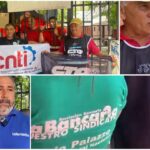
Joint statement reinforces global union for food security, focusing on small producers, sustainability and social inclusion
The ministerial meeting held last Thursday (17), in Brasilia, had as its theme “Promoting inclusive and sustainable agriculture through cooperation, innovation and equitable trade among the BRICS”. Ministers and agriculture leaders from the 11 member countries approved and signed a Joint statementreinforcing the commitment to sustainable agricultural development, food safety and reduction of inequalities in the field.
According to the Brazilian Ministry of Agriculture and Livestock, the BRICS represent 54.5% of the world’s population, one third of agricultural lands and more than a third of freshwater resources on the planet. The block accounts for 75% of global agricultural production and houses half of the 550 million existing family properties.
Leia +: BRICS promise a rural future with less hunger
“These data show the decisive role of BRICS in agriculture and world food security. Meetings like this are privileged spaces for dialogue and cooperation.”highlighted Minister Carlos Fávaro.
Food security and emergency cooperation
The first axis of the statement deals with food security, with emphasis on quality access to quality foods, especially in global crises. The document recognizes the importance of Global alliance against hunger and poverty and encourages the involvement of the New Development Bank (NDB) and the FIDA in related policies.
Agreeed measures are the strengthening of regulatory inventories, investments in storage infrastructure and minimum price policies to stabilize food access. In exceptional situations, such as scarcity or high price, BRICS commit to act with solidarity.
Family farming and technological inclusion
The executive secretary of the Ministry of Agrarian Development, Fernanda Machiaveli, highlighted the need for policies for family farming. “Technology should make it easier to work in the field, generate income and ensure healthy foods”he said.
The declaration proposes partnerships for the production of machines adapted to family farming, aiming to attract young people and promote a fair transition. “These producers suffer from climate change, but can also mitigate them with sustainable practices”explained Machiaveli.
Gender equality in the countryside
Egypt Ambassador Mai Khalil stressed the inclusion of rural women in the statement. “They are more vulnerable to hunger and malnutrition. Empowering them is crucial to achieving the SDGs”he said. The document provides for credit programs, training and access to technology for women.
Sustainability and restoration of land
The block defends the sustainable increase in agricultural productivity, with investments in research and partnerships between companies and universities. The declaration also proposes a financing mechanism for the recovery of degraded soils, aligned with the UN convention against desertification.
The third axis seeks to reduce commercial barriers, promote transparency and implement digital certification to expedite exchanges between members. Another goal is to create an emergency fund for countries affected by discharge in food and input prices.
New Action Plan 2025–2028
The event marked the beginning of a new cycle, replacing Plan 2021–2024 with a more ambitious agenda, aligned with the balance between agricultural production and sustainability. The goals will be submitted to the BRICS summit in July, in Rio de Janeiro.
“This statement is a political commitment to our partners and the world, especially in guaranteeing safe and nutritious foods”concluded Secretary Rivetla Cruz.
With information from BRICS BRASIL*
Source: https://www.ocafezinho.com/2025/04/21/brics-firmam-alianca-para-enfrentar-a-fome-no-mundo/

